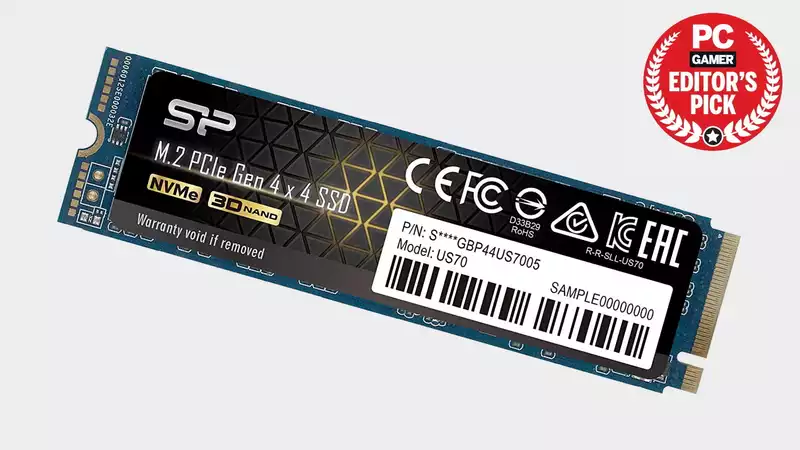You've probably never heard of the Silicon Power US70 PCIe Gen4x4 SSD, or of Silicon Power itself. This Taiwanese storage company was founded in 2003 and offers a variety of storage options, but the US70 is one of their latest M.2 NVMe SSDs.
If the name doesn't already give you an idea, this is a PCIe 4.0 SSD that offers the fastest sequential read and write speeds available today at 5,000 MB/s and 4,400 MB/s, respectively. And at $359, it is one of the most affordable PCIe 4.0 SSDs available today.
Being a PCIe 4.0 drive means that the Phison PS5016-E16 controller (currently the only PCIe 4.0 controller available for consumer use) will have another turn. We will also find DRAM (used as cache) and 3D NAND flash memory itself.
The NAND flash does not appear to be from a well-known manufacturer, but SiliconPower is competing by offering a whopping 3,600 TBW (total bytes written), which equates to 1.99 TB per day during the 5-year warranty period. Put another way, you could completely fill up this drive every day for five years and SiliconPower would still have you covered. Incredible. If that's not enough, this drive boasts an MTBF of 1,700,000 hours. While this may not seem particularly pleasing, it equates to over 194 years of 24/7 use.
There are also a number of the usual techniques to ensure that data is stored efficiently and reliably, such as wear leveling, 7% over-provisioning to reduce wear on the NAND flash, and bad block management. should also result in healthier performance, which will be discussed later.
One thing to note about the SiliconPower US70 is that the low price means that it contains nothing but the drive itself. There is no heatsink here, and you will be searching in vain for download codes for popular imaging software; this is not necessarily a problem, as upgrading to an SSD is a great opportunity to do a fresh install of Windows, but if you are looking for an easier life, you might want to look elsewhere might be a better choice.
One piece of software accessible on the download page is SP ToolBox, which provides the usual drive monitoring and diagnostic information. This isn't very fancy and isn't necessary for everyday activities, but it's nice to have the option if you want to poke around the status of your drive.
Performance-wise, there is a lot to like: the PCIe 4.0 drive is capable of staggering numbers compared to PCIe 3.0 SSDs, especially when it comes to sequential throughput. While it is true that we rarely encounter such situations in normal use, there are improvements underway, such as DirectStorage, that we expect will unlock the true potential of NVMe for gaming.
The SiliconPower US70 is also unbeatable when it comes to 4K performance, far outpacing the Samsung 970 Evo Plus, the most recommended in our Best NVMe SSDs guide. Real-world tests copying 30GB of data across the drive are also sound, taking just 2 minutes and 16 seconds, which equates to 225MB/second.
Not surprisingly, there is little difference between this drive and two other PCIe 4.0 drives we recently examined, the Addlink S90 and Sabrent Rocket PCIe 4.0. This is because all three of these drives use the same Phison E16 controller. Therefore, which one to purchase comes down to a matter of price and bundle content.
The fact that it is one of the least expensive PCIe 4.0 NVMe drives makes it an interesting proposition in itself. There is no compromise when it comes to performance, which makes it even more interesting. On top of that, it comes with a frankly incredible warranty, completing a drive that ticks all the important boxes. Yes, it may be lacking in the extras department, but that's something you'll be happy to pay for at the low price.
Of course, while $359 is a bargain, it's not cheap; the 1TB drive is half that, $179 to be exact. That's still a bargain, $20 less than the Sabrent Rocket PCIe 4.0 and Addlink S90, which offer almost identical performance.
Here the only other PCIe 4.0 drive available is Samsung's upcoming 980 Pro, which may offer up to 7,000 MB/s of performance. Of course, this is probably a much more expensive drive (it is a Pro model, after all), so it will not be a direct competitor to this drive, but we expect that other drive controllers may subsequently appear and be included in more affordable SSDs. Still, there is always something better in the immediate vicinity, but for now this is easy to recommend.
.

Comments